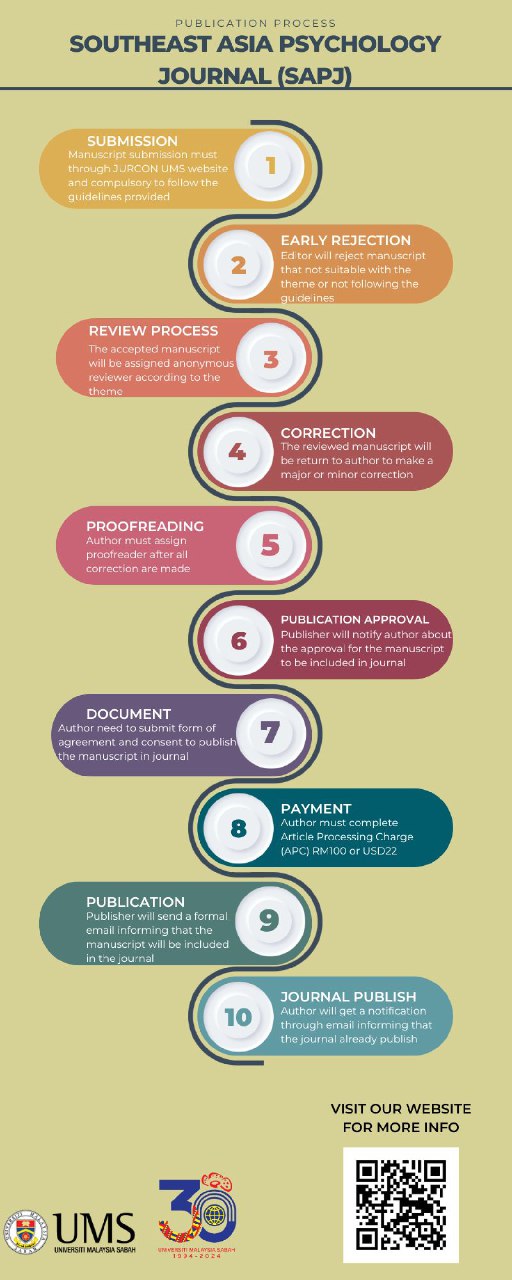SELF DISTANCING EFFECT IN WRITING NEGATIVE EVENTS REMEMBERING OR WRITING? IMPLICATIONS OF SELF-DISTANCING IN THE REFLECTION OF NEGATIVE EVENTS
DOI:
https://doi.org/10.51200/sapj.v8i2.5136Keywords:
Remembering, Writing, Self-Distance, Adaptive Self-ReflectionAbstract
Although many studies indicate that self-distancing facilitates adaptive self-reflection, it is necessary to examine the variables in the adaptive self-reflection process further to determine whether it will produce the same profile when the self-reflection is done through writing. As such, this study aims to examine a) whether the induction to remember from an actor's perspective and from an observer’s perspective has the same implications as the induction to write using the first-person pronouns and using own-name in facilitating adaptive self-reflection, and b) whether adaptive self-reflection through writing has the same profile as adaptive self-reflection through remembering (thinking). Two quasi-experimental studies (N=428) conducted in this research found that self-distancing was the only variable that differed significantly when we induced the actor's perspective and the observer's perspective (study 1), but the variables of self-distancing, emotional reactivity, and reconstruing differed significantly when self-reflection was conducted through writing manipulation using the first-person pronouns and using own-name. It was also found that adaptive self-reflection through writing (study 2) had a stronger correlation in the negative direction between self-distancing and emotional reactivity, recounting, avoidance, and in the positive direction with the variables of reconstruing, memory age, and perceived resolution, which meant that writing about negative experiences better facilitates adaptive self-reflection than just remembering. We also analyzed the intervening variables to see the direct or indirect relationship between key variables.
References
Fujita, K., & J.J, C. (2012). Transcending Temptation Through Abstraction: The Role of Construal Level in Self-Control. The Ohio State University.
Fujita, K., Trope, Y., Liberman, N., & Levin-Sagi, M. (2006). Construal levels and self-control. Journal of Personality and Social Psychology, 90, 351–367.
Gray, J. A., & Mcnaughton, N. (2003). The Neuropsychology of Anxiety (33rd ed.). New York: Oxford University Press.
Hoeksema, S. ., Wisco, B. E., & Lyubomirsky, S. (2008). Rethiking Rumination. Association of Psychological Science, 3(5).
Ismailova et.all. (2013). Psychological Ways of Coping with Difficult Life Situations of Men of All Ages. Middle-East Journal of Scientific Research, 14(12), 1618–1622.
Klein, K. (2010). Coherence and Narrative Structure in Personal Accounts of Stressful Experiences, 29(3), 256–280.
Kross, E, et. al. (2014). Self-Talk as a Regulatory Mechanism: How You Do It Matters. Journal of Personality & Social Psychology, 106(2), 304–324.
Kross, E. (2009). When the Self Becomes Other Toward an Integrative Understanding of the Processes Distinguishing Adaptive Self-reflection from Rumination. Journal of Values, Empathy, and Fairness across Social Barriers, 1167, 35–40.
Kross, E. (2014). From a Distance : Implications of Spontaneous Self-Distancing for Adaptive From a Distance : Implications of Spontaneous Self-Distancing for Adaptive Self-Reflection, (June). https://doi.org/10.1037/a0019205
Kross, E., & Ayduk, O. (2008). Facilitating Adaptive Emotional Analysis : Distinguishing Distanced-Analysis of Depressive Experiences From Immersed-Analysis and Distraction. PSPB, 34(7), 924–938. https://doi.org/10.1177/0146167208315938
Kross, E., & Ayduk, O. (2016). Self-Distancing: Theory, Research, and Current Directions. Advances in Experimental Social Psychology.
Kross, E., Ayduk, O., & Mischel, W. (2005). Distinguishing Rumination From Reflective Processing of Negative Emotions. Psychological Science.








